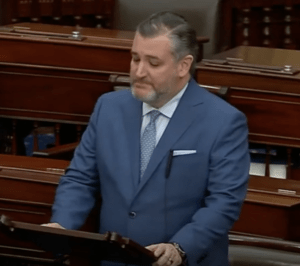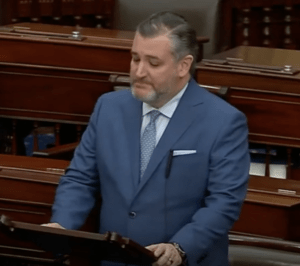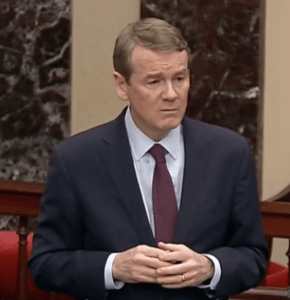
In a recent development on Capitol Hill, Senator Ted Cruz, along with fellow Republican senators, faced a setback in their attempt to secure unanimous consent for a temporary extension of the Federal Aviation Administration’s (FAA) authorization. The move comes as the current extension of FAA Reauthorization is set to expire at the end of the year. Despite previous efforts to negotiate a comprehensive, bipartisan FAA reauthorization bill, Senator Cruz expressed concern over the ongoing delays and the possibility of another short-term extension until 2025. He emphasized the urgency of the situation, highlighting the record number of over 7.5 million Americans expected to travel during the upcoming holiday season, and the potential adverse impacts on air travel and cargo shipments without a timely FAA extension.

This image is property of dronelife.com.
Senator Cruz faces setback in securing unanimous consent for FAA reauthorization extension
In a recent development on Capitol Hill, Senator Ted Cruz, along with fellow Republican senators, faced a setback in their attempt to secure unanimous consent for a temporary extension of the Federal Aviation Administration’s (FAA) authorization. The move comes as the current extension of FAA Reauthorization is set to expire at the end of the year. The bipartisan bill, previously passed by the House of Representatives, was blocked by Senator Michael Bennet, a Democrat from Colorado. This setback has raised concerns about the timely reauthorization of the FAA and the potential adverse impacts it could have on air travel and cargo shipments. Senator Cruz has highlighted the urgency of the situation, particularly emphasizing the record number of Americans expected to travel during the upcoming holiday season.
Current extension of FAA Reauthorization set to expire at the end of the year
With the current extension of FAA Reauthorization set to expire at the end of the year, the need for a swift reauthorization has become crucial. The FAA plays a vital role in ensuring the safety and efficiency of the nation’s airspace, as well as overseeing the regulation of aviation activities. Without a timely extension, there could be disruptions in air travel and cargo shipments, impacting millions of Americans during the busy holiday season. Senator Cruz has expressed concern over the recurring need for short-term extensions and the challenges faced during negotiations. These ongoing delays have created uncertainty and have hindered the ability to implement long-term plans and improvements in the aviation sector.

This image is property of dronelife.com.
Bipartisan bill previously passed by the House of Representatives blocked by Senator Michael Bennet
The bipartisan bill for FAA Reauthorization, which was previously passed by the House of Representatives, has faced opposition in the Senate. Senator Michael Bennet, a Democrat from Colorado, blocked the bill from moving forward. It is important to note that Senator Bennett’s objection was not about the contents of the FAA bill itself. Rather, it stemmed from concerns about moving on from current discussions about immigration and additional funding for Ukraine. This political obstacle has further complicated the reauthorization process and raised questions about the ability to reach a consensus before the current extension expires.
Senator Cruz highlights urgency of situation and potential adverse impacts without timely FAA extension
Senator Cruz has emphasized the urgency of the situation surrounding FAA reauthorization. With a record number of over 7.5 million Americans expected to travel during the upcoming holiday season, any delay in the reauthorization process could have significant adverse impacts. Delays in reauthorization could lead to disruptions in air travel and cargo shipments, affecting both individuals and businesses across the country. Senator Cruz has underscored the need for prompt action to ensure the smooth operation of the FAA and to avoid any unnecessary disruptions during this critical time.

This image is property of dronelife.com.
Senator Cruz expresses concern over recurring need for short-term extensions
One of the main concerns highlighted by Senator Cruz is the recurring need for short-term extensions of FAA Reauthorization. This process of constantly extending the authorization creates uncertainty and hampers long-term planning and improvements in the aviation sector. Senator Cruz has emphasized the importance of reaching a comprehensive, bipartisan agreement on FAA reauthorization to provide stability and ensure the efficient functioning of the FAA.
Challenges faced during negotiations and influence of special interests
The reauthorization of the FAA involves complex negotiations and navigating the interests of various stakeholders. Senator Cruz has acknowledged the challenges faced during these negotiations and the influence of certain special interests. One particular interest that has been highlighted is the pilots’ union. Balancing the needs and concerns of all parties involved is essential to ensure the passage of a comprehensive and effective FAA reauthorization bill.

This image is property of dronelife.com.
Cruz and Senator Cantwell worked on comprehensive FAA reauthorization bill
Senator Cruz, along with Senator Cantwell, has worked on a comprehensive FAA reauthorization bill that addresses various aspects, including airport infrastructure, workforce challenges, and safety measures. Their bipartisan efforts demonstrate a commitment to finding common ground and creating a bill that reflects the needs of the agency, the industry, and the flying public. Despite their efforts, the ongoing delays and the possibility of another short-term extension until 2025 have left Senator Cruz dissatisfied and concerned about the future of FAA reauthorization.
In 2011, last FAA authorization lapse resulted in furloughs and financial losses
The importance of timely reauthorization of the FAA is evident from the consequences of the last authorization lapse in 2011. More than 4,000 FAA employees were furloughed, resulting in financial losses of over $400 million. Additionally, billions of dollars worth of construction projects were halted, impacting over 70,000 construction jobs. Leaving the FAA without the certainty to operate would be a mistake, and Senator Cruz is committed to working with Senator Cantwell to negotiate a bipartisan FAA bill that prioritizes the agency, the industry, and the flying public.

This image is property of dronelife.com.
Senator Michael Bennett’s objection not about FAA bill contents
It is important to note that Senator Michael Bennett’s objection to the FAA bill was not about its contents. Instead, his objection stemmed from concerns about moving on from ongoing discussions about immigration and additional funding for Ukraine. This highlights the challenges faced in the political landscape and the need to address multiple priorities within the legislative process. Finding a way to navigate these hurdles and prioritize the timely reauthorization of the FAA is essential for ensuring the smooth functioning of the aviation industry.
House Committee on Infrastructure and Transportation approves FAA extension
To mitigate the risk of the FAA’s authorization expiring, the House Committee on Infrastructure and Transportation has approved an extension called the Airport and Airway Extension Act of 2023, Part II. This extension is designed to fund the FAA until March 8, 2024 if a comprehensive reauthorization is not passed before the current extension expires in December. This measure provides a temporary solution to ensure uninterrupted funding for the FAA and maintains the continuity of its operations during the reauthorization process.
Importance of prompt passage of FAA reauthorization for the drone industry
Prompt passage of FAA reauthorization is crucial not only for traditional aviation but also for the rapidly growing drone industry. The FAA plays a key role in regulating and overseeing drone operations, ensuring safety, and facilitating innovation in this sector. The reauthorization bill should address the unique needs and challenges of the drone industry, enabling its continued growth while maintaining safety standards. Failure to pass a timely reauthorization could hinder the progress and development of the drone industry, impacting innovation and economic opportunities.
U.S. Transportation Secretary urges Congress to pass FAA reauthorization before year-end
The urgency of FAA reauthorization has been underscored by U.S. Transportation Secretary Pete Buttigieg. He has urged Congress to pass the reauthorization bill before the end of the year to avoid any disruptions to air travel and cargo shipments. The timely passage of the reauthorization bill is crucial to ensure the continued functioning of the FAA and the safety and efficiency of the nation’s airspace.
House passes FAA reauthorization bill
In a positive development, the House of Representatives has already passed an FAA reauthorization bill. This bill demonstrates the commitment of lawmakers to address the needs of the aviation industry and to ensure the safe and efficient operation of the FAA. However, the bill still needs to be passed by the Senate and signed into law by the President. The progress made in the House is a step in the right direction, but further action is required to secure the reauthorization of the FAA before the current extension expires.
Innovative drone program combats global landmine crisis with AI
Innovative drone programs are emerging to tackle pressing global issues, such as the landmine crisis. PrecisionSafe Pro, a company specializing in drone technology, has launched a program that utilizes drones and artificial intelligence (AI) for landmine detection. This program has the potential to save lives by efficiently detecting and neutralizing landmines, minimizing risks to human life. Drone technology combined with AI is proving to be a powerful tool in addressing critical humanitarian and security challenges.
Overview of features inside the Zipline platform: NVIDIA’s Jetson Edge AI
The Zipline platform, developed by Zipline, a San Francisco-based company specializing in drone deliveries, offers a range of features powered by NVIDIA’s Jetson Edge AI. This advanced technology enables efficient data processing and analysis, enhancing the capabilities of drones for various applications. The combination of drones and AI has revolutionized industries such as delivery, inspection, and surveying, allowing for faster, safer, and more accurate operations.
FY 24 National Defense Authorization Act includes American Security Drone Act
The FY 24 National Defense Authorization Act includes the American Security Drone Act, which aims to limit the use of Chinese-made drones in national security operations. This legislation reflects concerns about potential risks to national security arising from the use of foreign-made drones, particularly those manufactured by Chinese companies. By limiting Chinese-made drone use, the act intends to safeguard sensitive information and maintain national security interests. This provision highlights the importance of domestic drone production and the need to prioritize security in the rapidly evolving drone industry.
In conclusion, the reauthorization of the FAA is a pressing matter that requires swift action from Congress. Senator Cruz and his fellow lawmakers face challenges in securing unanimous consent and navigating political hurdles, but the need for a timely reauthorization cannot be overstated. The FAA plays a central role in ensuring the safety and efficiency of air travel, as well as fostering innovation in the drone industry. Failure to pass a comprehensive reauthorization could result in disruptions to air travel, cargo shipments, and the growth of the drone sector. It is crucial for lawmakers to prioritize the reauthorization of the FAA and work towards a bipartisan agreement that meets the needs of all stakeholders involved.


